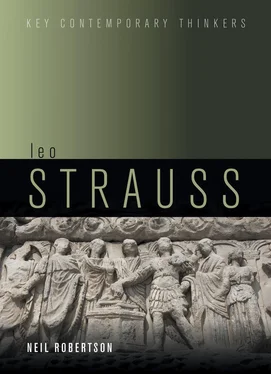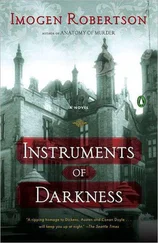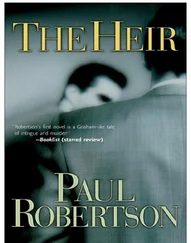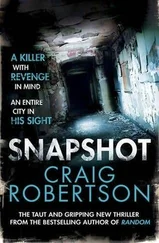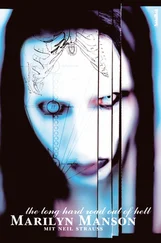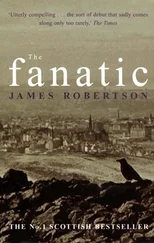It is a basic claim of this book that Strauss’s work as a whole cannot be understood or properly assessed except by seeing it as a response to the crisis of politics, thought, and culture that belonged to the Weimar Republic. Strauss’s intellectual project clearly emerged from this context, and understood that crisis as indicative of a deeper and more fundamental crisis in western civilization: the crisis of the West, or nihilism. Our first three chapters will be an effort to understand and explain Strauss’s standpoint as a response to the crisis of nihilism. Of course, many of the most significant thinkers of the twentieth century were engaged in responding to similar circumstances. We need to see Strauss’s as one such response, but an importantly distinct and compelling one.
Before considering these themes, it will be useful briefly to introduce three thinkers who are especially important in understanding and locating Strauss’s position. Friedrich Nietzsche, Edmund Husserl, and Martin Heidegger were crucial figures in articulating the intellectual world in which Strauss came to his own standpoint.
Friedrich Nietzsche(1844–1900), while he lived in the nineteenth century, only came to cultural and intellectual prominence in the first decades of the twentieth century and was, by Strauss’s own account, the dominating intellectual presence of the Weimar Republic (1918–33), where Strauss came to intellectual maturity. Nietzsche is famous for his account of European civilization as having been subject to the claim “God is dead.” Nietzsche provided the most radical consideration of the implications of this insight into modern culture: the death of God implied the loss not only of religious belief but of the whole framework of morality and science that depended on the claim of an otherworldly foundation. Nietzsche therefore saw his own time as one that was experiencing nihilism. In the face of the abysmal experience of the death of God, Nietzsche saw as illusionary and unsustainable the claims that the end of religion issued in a new egalitarian humanism and new scientific understanding of the world. Nietzsche proposed an alternative way to live in the face of nihilism through three “teachings”: the world as “will to power”; the proclamation of the Übermensch , the “Overman”; and the doctrine of the Eternal Return of the Same. Nietzsche explores these thoughts in a number of works, but especially central is Thus Spoke Zarathustra . As we shall see, Strauss understood himself as trying to face the demands of Nietzsche’s thought.
Edmund Husserl(1859–1938) was important to Strauss in pointing to a way of philosophizing that might allow for a standpoint that could escape Nietzsche’s devastating critique of the western tradition of philosophy as implicated in the nihilism western culture found itself possessed by. Husserl developed “phenomenology” as a way to engage in a philosophic reflection on the experienced world that avoids the kind of causal or metaphysical approaches to philosophy that dominated western philosophy, and were especially at work in modern philosophy’s turn to questions of knowledge of the external world. Husserl’s phenomenology sought to pre-empt the turn to this kind of knowledge by engaging in a philosophy of the description of things as they appeared to the self, bracketing, or excluding, questions of causality or metaphysics. Strauss was deeply impressed by Husserl and took up his turn to the “natural understanding” – the way things appear to us naturally – as a beginning point for a philosophy that might point a way out of the nihilism of the age.
Martin Heidegger(1889–1976) was an assistant to Husserl and developed and radicalized Husserl’s standpoint. Strauss encountered Heidegger as a young academic in the circle of Husserl and was deeply impressed by the power of Heidegger’s philosophical inquiry both as a philosopher and as an interpreter of classical philosophy. Heidegger recognized that Husserl’s phenomenology could be transformed by situating its inquiry in time and history: the self or ego that engages in phenomenological description could and should be seen not as a timeless, situationless being, but as one necessarily confronting a finite, historical situation in which time fundamentally informs that finitude. Heidegger is the intellectual source of existentialism. He agrees with Nietzsche that the modern era is one of nihilism. He finds in his radicalized phenomenology a way both to understand and confront this historical situation more deeply, and to seek to find a way of thinking that might open a stance beyond nihilism. Heidegger’s most important book, Being and Time , was published in 1927. In 1933, he joined the Nazi Party. In many ways Heidegger’s mentor, Husserl came to be deeply disturbed by, and felt betrayed by, the radical tendencies of his student’s thinking. Husserl sought in his own last writings to contest Heidegger’s claim that his work drew out the proper implication of Husserl’s own phenomenology.
Having briefly outlined the standpoints of these three major figures in Strauss’s intellectual background, we can turn to sketch five key themes in Strauss’s own thought.
The Return to Natural Right
As a young man, Strauss was deeply struck by Nietzsche’s characterization of the contemporary western world as an age of nihilism. Strauss accepted Nietzsche’s account of the self-destruction of reason that produced nihilism as a loss of all moral meaning. The modern world seemed incapable of discerning truth, above all moral and political truth. Strauss’s “change of orientation” in the early 1930s was a movement away from Nietzsche made possible by Strauss’s recognizing that it was only modern rationalism that was in trouble; pre-modern rationalism could be recovered in order to develop a standpoint without the nihilistic implications of modernity. Further, what pre-modern rationalism allowed was a return to “nature” as a standpoint or standard that would allow the recovery of moral content and moral meaning. Hence the recovery of what Strauss calls “natural right” – Strauss’s way of translating the ancient Greek phrase physei dikaion , or “what is just or right by nature.” If there could be the recovery of a standard of right or justice based upon nature and so independent of history – including the history of modernity – then the apparent victory of modern philosophy over ancient philosophy needed to be reconsidered.
For Strauss, the most developed form of the modern project that ended in nihilism was “historicism,” the belief that all human thought and meaning is historically determined and historically limited. Historicism meant that nothing could be said to be simply true or good because, from a historicist perspective, truth and goodness were historically relative. The promise of the recovery of “natural right” was the promise of the recovery of a standard that was not historically relative, but true or good by nature. For Strauss, natural right is what emerges when the power of historicism recedes as it recognizes its nihilistic character. The great benefit of returning to ancient Greek philosophy, above all as shown in the figure of Socrates, is the remarkable fact that there could be the discovery of natural right as an object of philosophical inquiry. It was this insight that was made available to Strauss in his “change of orientation,” and was to determine the standpoint of his subsequent thinking.
The Theological-Political Problem
To understand the significance and source of Strauss’s change of orientation and recovery of natural right, we must place it in the larger context of Strauss’s intellectual concerns. Strauss’s own description of this larger context is the “theological-political problem.” One way to view this problem is to see it in personal terms reflecting the predicament Strauss found himself in as a Jew who could no longer adhere to the orthodox faith in which he had been raised, but who equally could not identify himself with the larger German culture in which he found himself. Strauss experienced this as an antinomy between modern thought – ultimately Nietzschean atheism – and orthodoxy. The way out of this predicament was, for Strauss, in the return to pre-modern rationalism. Strauss first came to this discovery not in Plato or Socrates, but in medieval Jewish and Islamic thought, above all in the figure of Moses Maimonides (1138–1204).
Читать дальше
